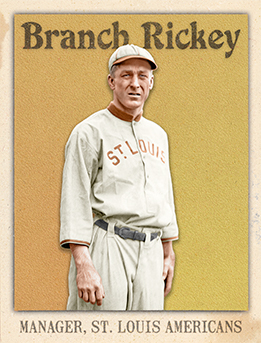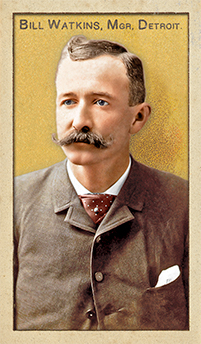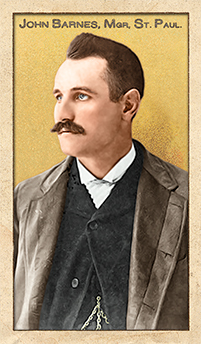- Series: Diamond Heads '15
- City: St. Louis
- Team: Browns (AL)
- League: American League
- Hall: National Baseball Hall of Fame
Wesley Branch Rickey (1881-1965) didn’t live to see his 1967 entrance into the Hall of Fame as one of the legends in baseball’s executive ranks, but he did see the legacy of his pioneering efforts to end decades of shameful discrimination in the sport he loved. In the year of his death, one in five MLB players was African American. In his half-century in the front office, Rickey invented the farm system and had one of the keenest eyes for talent.
- In WWI Rickey commanded a chemical warfare unit that included Ty Cobb and Christy Mathewson
- Hired Allan Roth as the first team statistician in 1947, thus becoming an early progenitor of sabermetrics
- Jackie Robinson eulogized Rickey as having done more for African Americans than anyone but Abraham Lincoln
- Elected to Hall of Fame: 1967
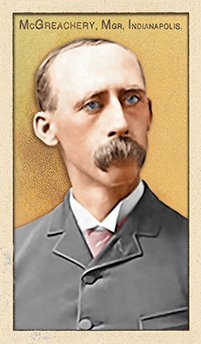
- Series: Beginnings: 1880's
- City: Indianapolis
- Team: Hoosiers (NL)
- League: National League
- Hall: National Baseball Hall of Fame
An error or a practical joke? The Old Judge series is littered with errors, primarily in the form of misspelled names. There are also a number of cards that are intentionally humorous. The McGreachery card is likely a display of the sense of humor within Goodwin’s art department rather than a mistake.
During this card’s production run from 1887 to 1890, James Laurie White was the oldest player in the major leagues all four years, spanning his age 39 to age 42 campaigns. By that point, White was a baseball veteran of 20 seasons whose tenure predated the National league by five years and ended with the birth of the Player’s League in 1890. By all accounts, White was a serious, religious and principled man who earned the nickname Deacon. White didn’t drink, smoke or gamble and was as knowledgeable and articulate about farming as he was about baseball. Henry Chadwick wrote that White’s character was beyond reproach. Combine White’s character, values, baseball moxie, and his old world perspective - which purportedly included a belief that the Earth is flat - and you can see why the folks at Old Judge might poke fun.
- Excluding the Ars Longa 1880s Diamond Duos & Spotted Ties subsets, Deacon White will be the only player represented in the 1880s base set twice, although his name will still only appear on one card. I just couldn’t resist paying a little tribute to the humor in the Old Judge series by creating a card for the dear old crank McGreachery.
- Why the Old Judge folks assigned the fictitious McGreachery as a manager may be obvious. Why they assigned him to Indianapolis is a mystery and perhaps an inside joke that has long since lost its insiders.
- Watch Burnham is a man who appears in the Old Judge series who actually did manage the Indianapolis Hoosiers - for all of 28 games (losing 22 of them). Perhaps the absence of an enduring Indianapolis manager in the Old Judge series prompted McGreachery's assignment there.
- Only two examples of the original Old Judge card are known to exist
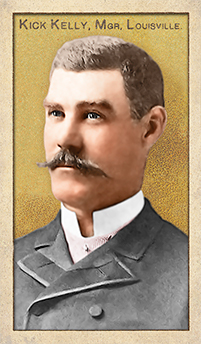
- Series: Beginnings: 1880's
- City: Louisville
- Team: Colonels
- League: American Association
John O. Kelly (1856-1926) was known variously as Kick, Honest John and Diamond John. He was a catcher for the Syracuse Stars and Troy Trojans in 1879 before turning to his real calling of refereeing, first in baseball and later in the boxing ring. As an operator of gambling houses in his native New York City, John “officiated” at another kind of gaming later in life.
Kick’s record at bat was a perfect motive to change uniforms. He averaged .155 in his 16 games in the early major leagues. By 1882 Kelly was umpiring in the National League and moved to the American Association the following season. Men in blue fared poorly in the diamond’s dawn. They were vilified and, too often, pelted by players and fans alike. Working alone gave ample opportunity for wily runners to cheat. Kelly lasted longer than most of his era. He and another “Honest John” (Gaffney) presided over the 1887 post-season match between the NL’s Wolverines and AA’s Browns. They pioneered a two-ump system that would transform the game.
- Kelly turned briefly to managing with the Louisville Colonels in 1887 and had a successful 76-60 season. His club flagged the following year and Kick was canned
- Refereeing Jim Corbett’s match in 1894 nearly cost Kelly his life. Baseball wasn’t the only hazardous profession for officials. Well-armed fans intimidated Kelly into a no-call
- Series: Beginnings: 1880's
- City: Detroit
- Team: Wolverines
- League: National League
William Henry Watkins’ (1858-1937) playing career was cut short in his first season by a bean ball that nearly killed him. The rookie had already been named manager, demonstrating leadership skills he would display his long and productive life. Led the Wolverines from the cellar to the top in only 3 yrs (1887).
- Was embroiled in the struggles to est. a 2nd ML as owner/mgr of Indianapolis in 1901
- Went on to a successful business career in Marysville MI, a town he helped found
- Series: Beginnings: 1880's
- City: St. Paul
- Team: Apostles
- League: Western Association
John Sloane Barnes (1855-1929) was a dapper dude, confidently embracing the challenges of pioneering the new national pastime in the 1880s and 90s. After toiling in the Upper Midwest with three St. Paul franchises, Barnes came into his own out in the Pacific Northwest, earning the title “Father” of that tradition. He founded the Pacific Northwest League in 1890 with Spokane, then helped get the Western League started. As that was the precursor to the new American League, Barnes left an indelible imprint on the modern game. Devoted not only to looking good, he traveled to Asia promoting physical fitness, returning in 1909 to helm the Butte Miners in the Inter-Mountain League.
- In 1890, John quickly helped arrange financing to commission teams in Seattle, Portland and Tacoma in addition to his Bunchgrassers, the champs that year
